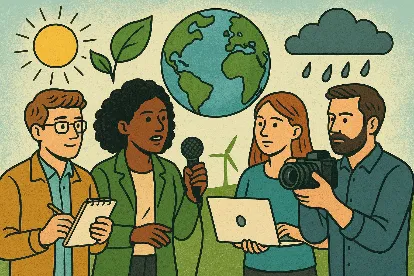By Abdallah el-Kurebe I August 20, 2025: Climate and environmental experts in West Africa have sounded the alarm on the poor state of climate journalism in the region, revealing that media coverage is often limited, reactive, and lacks depth.
The concern was highlighted at the recent virtual launch of the West African Journalists for Environment, Science, Health, and Agriculture (WAJESHA) a new non-profit journalism network dedicated to improving science-based reporting across the sub-region.
Organized by the Centre for Climate Change and Food Security (CCCFS), the launch event on August 15, 2025, united journalists, researchers, and development advocates from West Africa, Asia, and beyond. Speakers emphasized the urgent need to strengthen the quality of reporting to hold governments accountable, fight misinformation, and connect climate change with critical issues such as health, agriculture, and daily livelihoods.
In his keynote address, Mr. Nii Commey, Head of Communication at the West African Science Service Centre on Climate Change and Adapted Land Use (WASCAL), pointed out that climate reporting in West Africa remains largely reactive and driven by major international events or disasters.
“In Nigeria, less than 0.1 percent of media content is dedicated to climate change,” he revealed, noting that much reportage simply echoes official statements without deep analysis or scientific backing.
Mr. Commey called for investments in specialist journalists, newsroom support, and the inclusion of indigenous knowledge, such as sacred forests and traditional conservation practices, as crucial parts of climate solutions.
Launching WAJESHA officially, Engr. Mahmud Mohammed-Nurudeen, Executive Director of CCCFS, shared that the initiative emerged out of necessity after years of funding denials.
“Millions across West Africa suffer from climate change, food insecurity, pollution, and weak health systems, yet their stories are ignored. WAJESHA exists because we refused to give up,” he said.
WAJESHA builds on earlier biodiversity reporting training for over 30 journalists organized by CCCFS in partnership with Nigeria’s The North Journals and India’s Centre for Science & Environment.
In a goodwill message, Dr. Beatrice Wiafe Addai, CEO of Peace and Love Hospitals and President of Breast Care International Ghana, urged WAJESHA members to bring integrity, inclusivity, and accountability to their reporting. She highlighted that health and agriculture topics remain underreported compared to politics and entertainment, stressing the importance of specialized knowledge and adapting to digital transformation.
Mr. Assane Diouf, Senior Communication Officer of the African Population and Health Research Center, underlined the human impact of climate change, urging journalists to humanize scientific data by connecting it with maternal health, food security, mental stress, and migration issues.
From India, Mr. Richard Mahapatra of Down to Earth magazine emphasized investigative journalism’s role in uncovering environmental injustices that disproportionately affect developing regions like West Africa. “Journalists must expose who is responsible for loss and damage and advocate for changing global systems,” he said.
WAJESHA members who participated in earlier training shared how the program helped them link science, local voices, and policy in their journalism. The network aims to unite journalists across all 16 ECOWAS member states, amplifying indigenous knowledge and science-based storytelling as central to sustainable development.
“We are not just writing stories; we are writing the future,” Engr. Mahmud concluded.


